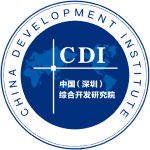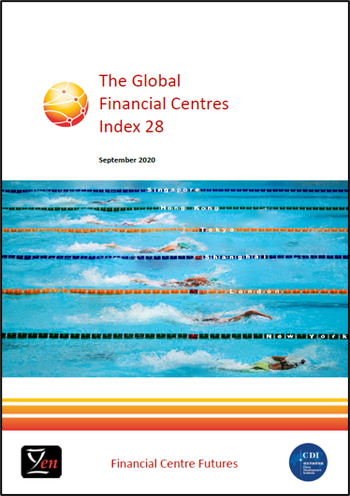Authors
Mike Wardle, Professor Michael Mainelli
Published by
Long Finance & Financial Centre Futures (September 2020), 69 pages. Produced by Z/Yen in Partnership with CDI.
Share on social media:


The Global Financial Centres Index 28 - Supplement "Shanghai’s Development As A Financial Centre"
The twenty-eighth edition of the Global Financial Centres Index (GFCI 28) was published on 25 September 2020. GFCI 28 provides evaluations of future competitiveness and rankings for 111 major financial centres around the world. The GFCI serves as a valuable reference for policy and investment decision-makers.
China Development Institute (CDI) in Shenzhen and Z/Yen Partners in London collaborate in producing the GFCI. The GFCI is updated and published every March and September, and receives considerable attention from the global financial community.
121 financial centres were researched for GFCI 28 of which 111 are now in the main index. The GFCI is compiled using 138 instrumental factors. These quantitative measures are provided by third parties including the World Bank, the Economist Intelligence Unit, the OECD and the United Nations.
The instrumental factors are combined with financial centre assessments provided by respondents to the GFCI online questionnaire. GFCI 28 uses 54,509 assessments from 8,549 respondents.
The Results Of GFCI 28 Include:
- GFCI 28 again shows a relatively high level of volatility, with 23 centres rising ten or more places in the rankings and 20 falling ten or more places.
- Overall, the average rating of centres in the index dropped over 41 points (6.25%) from GFCI 27, which may indicate a more general lack of confidence in finance during a time of continuing uncertainty around international trade, the impact of the covid-19 pandemic on individual economies, and geopolitical and local unrest.
- All of the top ten centres in the index increased their ratings in GFCI 28, reversing recent trends. Of the next 40 centres, 12 improved their rating while 27 fell. This may indicate increased confidence in leading centres during the covid-19 pandemic.
Leading Centres
- New York retains its first place in the index, although London in second place has made up ground in the ratings, now only four points behind the leader (27 points in GFCI 27).
- Shanghai moved up one place to third and Tokyo dropped one place to fourth, although only one point separates them in the ratings. Similarly, Hong Kong moved up a place to rank fifth and Singapore fell one place to sixth, again with only one point separating Hong Kong and Singapore in the ratings.
- Shenzhen and Zurich entered the top ten in this edition, replacing Los Angeles and Geneva.
- Within the top 30 centres, Luxembourg, Boston, Seoul, and Madrid rose by more than five places.
Western Europe
- After its strong performance in GFCI 27, centres in Western Europe had mixed fortunes in GFCI 28, with 15 centres rising in the rankings and 12 falling. However, the average drop in ratings was only 21 points (3.17%) in this region.
Asia/Pacific
- Asia/Pacific Centres had a mixed performance in GFCI 28, with ten centres falling in the rankings and 14 rising. This appears to reflect levels of confidence in the stability of Asian centres and in their approach to sustainable finance, which appears to be growing in its effect on the overall rating of centres.
- Taipei, Chengdu, and Qingdao all rose more than 30 places in the rankings.
North America
- North American centres showed the least change in ratings across the regions, falling on average just 9 points (1.3%).
- Boston, Washington DC, and San Diego all improved five or more places in the rankings.
- Six out of the eleven North American centres are in the top 20, up from four in GFCI 27.
Eastern Europe & Central Asia
- Following a good performance in ratings in GFCI 27, all centres in this region saw their ratings fall, and only three of the 16 centres in the region—Moscow, Istanbul, and Athens—improved their rank.
- Sofia, Baku, and Almaty fell over 30 ranking places from GFCI 27 to GFCI 28.
Middle East & Africa
- All 13 Centres in the Middle East & Africa performed poorly once again, with all 13 centres falling in the ratings and with only Abu Dhabi, Mauritius and Cape Town improving in the rankings.
Latin America & The Caribbean
- While all centres in this region fell in the ratings, with the average rating for the region falling 54 points (8.66%).
FinTech
- New York leads the FinTech rankings, followed by Beijing, Shanghai, London, and Shenzhen. Five of the top ten centres for FinTech are Chinese.
- In our recently published Smart Centres Index, focusing more broadly on innovation and technology, Chinese centres did not feature as strongly as they have in the Fintech rankings. This suggests a particular focus on Fintech in these centres.




